The next QUISCO meeting will be at the University of Strathclyde on the 7/11/2012 from 11am to 6pm. For directions to the university please see here. Links to campus maps are below.
Speakers include Dan Browne (UCL), Andreas Buchleitner (Freiburg), Jeremy O’Brien, (Bristol), Vedran Dunjko (Heriot-Watt), Daniel Oi (Strathclyde) and Raphael Dias Salva (Edinburgh).
There is no registration fee but in order to facilitate catering please send a message to quantumschmantum (this is AT google mail) in order to register.
The current schedule is as follows:
Morning Session: JA325, John Anderson Building
The best way into the building is either via the north facing side (which takes you into level 5, or by entering through the Colville building (building 20). Please see this campus map. The room is on level 3.
11.00am – 11.50am Jeremy O’Brien (University of Bristol)
“Photonic quantum technologies”
Abstract: “Quantum information science aims to harness uniquely quantum mechanical properties to enhance measurement, information and communication technologies, and to explore fundamental aspects of quantum physics. Of the various approaches to quantum computing, photons are particularly appealing for their low-noise properties and ease of manipulation at the single qubit level. Encoding quantum information in photons is also an appealing approach to other quantum technologies, including quantum communication, metrology and measurement. We have developed an integrated waveguide approach to photonic quantum circuits for high performance, miniaturization and scalability. We have begun to address the challenges of scaling up quantum circuits using new insights into how controlled operations can be efficiently realised, and demonstrated Shor’s algorithm with consecutive CNOT gates and the iterative phase estimation algorithm. We have shown how quantum circuits can be reconfigured, using thermo-optic phase shifters to realise a highly recongigurable quantum circuit able to perform almost any function on two photonic qubits, and electro-optic phase shifters in lithium niobate to rapidly manipulate the path and polarisation of telecomm wavelength single photons. We have addressed miniaturisation using multimode interference coupler architectures to directly implement NxN Hadamard operations, and by using high refractive index contrast materials such as SiOxNy, in which we have implemented quantum walks of correlated photons, and Si, in which we have demonstrated generation of orbital angular momentum states of light. We have incorporated microfluidic channels for the delivery of samples to measure the concentration of a blood protein with entangled states of light. We have begun to address the integration of superconducting single photon detectors and diamond and non-linear single photon sources. Finally, we give an overview of recent work on fundamental aspects of quantum measurement, including a quantum version of Wheeler’s delayed choice experiment.”
11.50am – 12.40pm Vedran Dunjko (University of Edinburgh)
“Universal Blind Quantum Computation with Weak Coherent Pulses”
Abstract: “The Universal Blind Quantum Computation (UBQC) protocol allows a client to perform quantum computation on a remote server. In an ideal setting, perfect privacy is guaranteed if the client is capable of producing specific, randomly chosen single qubit states. While from a theoretical point of view, this may constitute the lowest possible quantum requirement, from a pragmatic point of view, generation of such states to be sent along long distances can never be achieved perfectly. We introduce the concept of epsilon-blindness for UBQC, in analogy to the concept of epsilon-security developed for other cryptographic protocols, allowing us to characterize the robustness and security properties of the protocol under possible imperfections. We also present a remote blind single qubit preparation protocol with weak coherent pulses for the client to prepare, in a delegated fashion, quantum states arbitrarily close to perfect random single qubit states, allowing us to efficiently achieve $\epsilon$-blind UBQC for any epsilon>0, even if the channel between the client and the server is arbitrarily lossy. Time permitting, and conditional on the interests of the audience, additional topics related UBQC will also be discussed.”
12.40pm – 14.00pm Lunch (location TBA)
Afternoon Session: RC512, Royal College Building
Please see this campus map for how to get to the building. The room is on level 5, but other than that there is limited logic to the room numbering, so please follow a local.
14.00pm -14.50pm Andreas Buchleitner (Universität Freiburg)
“Chaos and disorder for quantum control”
Abstract: “Quantum control is usually expected to be a delicate issue, based on carefully tuning system-specific parameters which then enforce that type of coherent quantum dynamics one is interested in. This in general implies fragile solutions, with respect to uncontrolled perturbations or imprecisions. An alternative route consists in using the eigenstates of complex quantum systems as carriers of robust control. The lecture will present concrete examples which underpin this latter perspective, and discuss possible experimental implementations.”
14.50pm -15.40pm Daniel Oi (University of Strathclyde)
“Measuring Nothing”
Abstract: “Non-destructive measurements of the optical field are important for a host of applications in communication, state preparation, and they also give us new tools to probe its quantum nature. Here, we describe a novel type of measurement which implements the ideal projection onto the vacuum or its complement, i.e. not vacuum, but preserving the ideal state in the latter case. For the not-vacuum result, this requires the measurement to obtain no information of the photon number distribution (other than it is greater than zero) even in principle. Conventional approaches suffer from a square root dependence of the coupling to a probe on photon number, hence leading to non-ideal dynamics. Here, we show how an adiabatic transition overcomes this photon number dependence and leads to the unusual non-linearity required. We propose experimental implementations which should be technically feasible given state of art the parameters and simulate the performance of the technique in the presence of decoherence.”
15.40pm – 16.10pm Coffee Break (location TBA)
16.10pm – 17.00pm Daniel Browne (University College London)
“Qudit magic state distillation”
Abstract: “Magic state distillation is an important technique in fault tolerant quantum computation, enabling universal quantum computation with fault tolerant Clifford group gates. In my talk, I will show how it can be generalised to qudits, and that this forces us to answer lots of fundamental questions about qudit quantum computation which surprisingly had not been addressed before – such as what makes a universal set of qudit gates?”
17.00pm – 17.50pm Raphael Dias Silva (Universidade Federal Fiuminense/University of Edinburgh)
“Compact quantum circuits from one-way quantum computation”
Abstract: “In this talk I will introduce a new method to translate measurement patterns to the circuit model and discuss some applications of it. We start by giving a straightforward circuit representation of any 1WQC, at the cost of introducing many ancilla wires. We then propose a set of four simple circuit identities that explore the relationship between the entanglement resource and correction structure of a 1WQC, allowing one to obtain equivalent circuits acting on fewer qubits. In the second part of the talk, I will show how to optimize arbitrary quantum circuits by using back-and-forth translation between the QC and 1WQC models.”
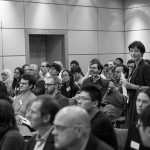 Many QUISCO representatives were presenting at the Institute of Physics Meeting on Quantum Technologies in London 17-18th December 2012. Researchers from Glasgow, Strathclyde, Heriot-Watt and Edinburgh universities gave both invited and contributed lectures on their latest results.
Many QUISCO representatives were presenting at the Institute of Physics Meeting on Quantum Technologies in London 17-18th December 2012. Researchers from Glasgow, Strathclyde, Heriot-Watt and Edinburgh universities gave both invited and contributed lectures on their latest results.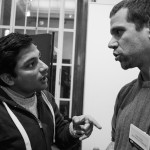 Vedran Dunjko (Heriot-Watt, right) presented experimental results implementing quantum digital signatures, a method by which “quantum cheques” could be signed and verified.
Vedran Dunjko (Heriot-Watt, right) presented experimental results implementing quantum digital signatures, a method by which “quantum cheques” could be signed and verified.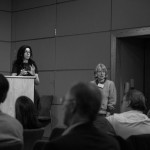 Sabrina Maniscalco (Heriot-Watt, left) showed how a particular form of quantum noise, Non-Markovianity, could be characterised and even used as a diagnostic tool.
Sabrina Maniscalco (Heriot-Watt, left) showed how a particular form of quantum noise, Non-Markovianity, could be characterised and even used as a diagnostic tool.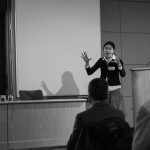 Jacqi Romero (Glasgow, right) explained the phenomenon of orbital angular momentum of light and recent experimental progress on its production and manipulation.
Jacqi Romero (Glasgow, right) explained the phenomenon of orbital angular momentum of light and recent experimental progress on its production and manipulation.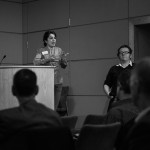 Elham Kashfi (Edinburgh, left) gave an invited talk on the verification of quantum computers. This combines cryptographic secrecy with quantum computation to allow the secure operation of quantum servers. More generally, it tries to answer the question of how do we make sure our quantum devices are performing as promised.
Elham Kashfi (Edinburgh, left) gave an invited talk on the verification of quantum computers. This combines cryptographic secrecy with quantum computation to allow the secure operation of quantum servers. More generally, it tries to answer the question of how do we make sure our quantum devices are performing as promised.